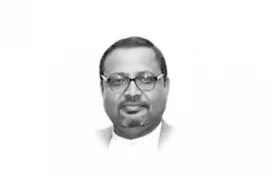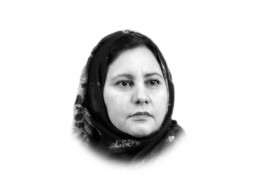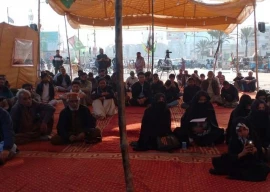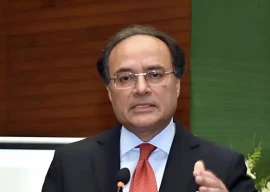One year into his tenure, there was little to discern between any other chief’s tenure and the brilliant one who now held the reins. At an annual get-together, hopeful subordinates got around him to inquire, “Sir, it is already a year, and nothing has changed?” “What should have?” the chief asked. “Oh sir, all that we used to talk about; remember, when you were a brigadier, and then as you went through your promotion cycles and one prized appointment after another?” He turned around and quipped, “My dear friends, even though I am the chief, I must still work through a number of people and decision-makers and systems and structures that run the institution of the army. I am not a pharaoh or a dictator who runs the system on whims. Systems and structures run the army, else if individuals were in control, there would be mayhem.” The general went on to complete his tenure and the army continues to run as an institution, warts and all.

Someone is soon going to throw at me two names: Lee Kuan Yew and Mahathir Mohamad. Both became successful managers of a significant turnaround of their nations’ fortunes. Kudos to both and that is why they are recognised. Mahathir, though, had his share of political and personal ups and downs as he negotiated Malaysia into an economic boom by following strictures, which ensured that little was wasted or stolen, and by pursuing an economic agenda. Malaysia stands on a reasonably firm base today. But Lee Kuan Yew was an outright dictator, and a good one at that. He had the benefit to run his city-state almost as a mayor, enabling the single-minded focus that is needed to galvanise resources to reach a common objective. Singapore may be one of the most prosperous nations in the world today, but we don’t like dictators, and Pakistan is not a city-state. So, while well done Lee Kuan, we will have to find our own way ahead.
Mahathir of Malaysia enthuses imagination. A sliver of a country, third the size of Pakistan and with one-sixth the population, with an even mix of the native Malays and the industrious rest, is a very decent model that was led into a homogenous nationhood. Pakistan is far more complex, just in its composition and regional sensitivities that in a federation need careful handling. Forget the rest, radicalism, terrorism, insurgencies and parochialism ‘in all their hues and manifestations’ are enough meal on the table. One will need a dozen Mahathirs to set this right, all working together with a single-minded focus with equal intensity. Leaders create systems and provide structures that enable delegated functioning with due processes. In a nation of almost 200 million, it will always be an incremental move-on. For a view, see next-door India.
An interesting analysis has been done by Rajmohan Gandhi in his recent publication, Punjab: A History from Aurangzeb to Mountbatten. He determines that former north India, including all of Pakistan, was ravaged by many an adventurer from the West. Always in awe of invading hordes, the natives cyclically bowed before every Ghauri and every Abdali. If it was not them, it was Maharaja Ranjit Singh, and then the British and then in the same vein, another liberator and a messiah in the true sense, for a change, the Quaid e Azam; and then Liaquat Ali Khan, followed by Ayub Khan and Zulfikar Ali Bhutto. Immersed in an un-satiated impulse to find and worship new saviours, this nation blinds itself with hoped-for deliverers. Both Tahirul Qadri and Imran Khan carry virtues easily confused with such escapism. Reality, though, is far different. IK means well, but understands little. Those who understand, unfortunately, do not mean well. In its current formulation, we remain in a snake-pit of interesting collections.
When Bhutto took over, he ventured a change. He understood that a change is only possible with structural implants, and thus went ahead with civil service reforms and the changes in the military system, which arose more out of the Hamoodur Rehman Commission. He was a brave man; ordinary mortals do not venture to touch structures because they have nothing to replace them with. ZAB did, though the results at best have remained mixed. The Chairman Joint Chiefs of Staff Committee system, in all these years, has never realised the power that could have balanced the authority resident in the chief of the army staff; and the civil service, to many of its own, was always a misstep because it diluted the power of the bureaucrat. Indeed, if it did, I will count that a success by a long way. Both intended changes failed to materialise in the spirit of their placement. The founding strictures are at times obdurate and resilient. Even ZAB could not shatter the convention, finally falling prey to it.
What of the poor adulating souls, who longingly brave the elements every evening to be in Khan’s company. I feel if the current trends hold and if he is able to sustain the sentiment long enough, he may finally realise his dream at the helm. But then will begin the next phase of the saga. Yes, he will have people gather around him, some right ones too, yet he may be stuck with the structures that have till date established a certain behavioural pattern. Changing those will be his challenge.
Else, the difference between a well-performing system and a weak one may well be in the order of some nineteen-and-a-half to twenty-and-a-half. This is when the proverbial will hit the fan; and, this is when dreams may shatter. Disappointment from another messiah; a failure of another saviour. It may still be in the distance, but it is good to know there remains no shortcut to hard grind. Incremental, gradual improvement. The only other way is inquilab. On last reports though, even inquilab had joined the bandwagon. At times, the wait is deadly, but it is worth its time. The messiah is in an augmentative, collective effort of the 200 million who must toil for years to make the miracle happen. It is not a person. Can Khan state that?
Published in The Express Tribune, October 18th, 2014.
Like Opinion & Editorial on Facebook, follow @ETOpEd on Twitter to receive all updates on all our daily pieces.
COMMENTS (13)
Comments are moderated and generally will be posted if they are on-topic and not abusive.
For more information, please see our Comments FAQ














1720030784-0/Smog-free-Lahore-(14)1720030784-0-270x192.webp)
1733421998-0/New-Project-(1)1733421998-0-270x192.webp)
1735283394-0/sidra--(9)1735283394-0-270x192.webp)


@Parvez: "………but change will come, if not today then tomorrow, because as you know, even armies can not stop an idea whose time has come...."
Perhaps. Perhaps not. Definitely not with this set of game changers.
This is an interesting article to sell the notion of Bhutto, whose name the writer's Chairman Bilawal also uses due to inheritance... On the other hand, Bilawal calls Imran Khan as KathPutli ie, a Puppet. Therefore, it will be over-expectation from any Puppet to put forward any vision! IK's only vision is to "make Naya Pakistan so that I can get married". He has told his grown up sons in UK that "they will soon see their Dad as Prime Minister". Such a selfish person has already failed to deliver in Khyber-Pakhtunkhwa.
@S R H Hashmi Sir, there is no doubt that all Bhutto wanted was power for which he even contributed in the secession of Pakistan. "Idhar hum udher tum" approach towards East Pakistan resulted in the creation of Bangla Desh. BB also made sure that only her family ruled Pakistan otherwise, why would Bilawal be the "Co-Chairman" of PPP?
".....I am not a pharaoh or a dictator who runs the system on whims. Systems and structures run the army, else if individuals were in control, there would be mayhem.”
That is very encouraging. How come the generals don't apply the same logic before they want to take over the country, its system and resources and run it as a dictator or an individual in control of the whole system(s), i.e. civilians, political system, foreign relation system, economic system etc.
The only reasons the generals/COAS run the army within the system with all the individual participating is because the COAS knows that, just like him, everybody in the system that he runs, i.e. the armed forces, also carry big guns and they wouldn't be afraid to use them if COAS goes against their syatem's interest.
There are no messiahs and the faster people realize they need to be the agent of change the better. Else every failure of the individual will look like a foreign inspired or funded conspiracy.
The problem with Pakistan is that Pakistan is a problem.
Take a deep breath and regain your concentration if the sentence above has shaken you up. Now try figuring it out.
Many an expert has tried to unravel the riddle that is Pakistan with varying degrees of success. The bairooni ones are a bit clearer due to the advantages of a distant view. But everyone has suffered from two handicaps. Firstly due to our proclivity to draw our guns at the speed of light, and secondly due to the matters we consider so sacrosanct that we allow no one to even touch them. There are numerous taboos, which shut many a window to serious thought.
The AVM has not succeeded in what he set out to do, and may be I too have not. We must wait for the things to sort themselves out. No help is going to help us.
@Ranjha:
But, prey what makes you assume that it doesnt count in the Bhuttos. A thought, you know.
Zulfikar Ali Bhutto was indeed a capable man but he was considered to have a passion to exercise power at any cost. Air Marshal (retd) Asghar Khan, a greatly respected person, said words to the effect that ZAB said he would start from Sindh and asked him to start from the other end, running their anti-Ayub campaign and by the time they met midway, Ayub would be gone. At that, Asghar Khan asked as to what was the programme after that at which ZAB laughed and said "The people are foolish: we will just fool them and rule them," hearing which, Asghar Khan parted ways with him. Obviously, if ruling the country was all that ZAB was desperate for, he would have been willing to make even fatal compromises and agree to any arrangement that helped realize his dream.
As for Dr. Tahirul Qadri and Imran Khan, the two do not seem to have lust for power or wealth, and seem to be in no particular hurry to grab power, and at any cost. So, after the founding leaders, they seem to be the best choice available. And through their painstaking effort, they have awakened a sleeping nation which had just given up. If their struggle results in the holding of free and fair general elections which keep the criminals out of our assemblies, that itself would be a great achievement because that would at least give a hope that the better crop of leaders in the assemblies would further reform the government and the systems, putting the country on a path to progress, as compared to the present situation where we are headed straight for the disaster, and at an accelerated pace.
Obviously, no one expects that Dr. Tahirul Qadri and Imran Khan would be able to achieve all they claim in the next couple of years. However, if they achieve a marked improvement on the present and put institutions in the hands of best people out of the available lot, things will start improving and the country would be placed on a steady path to progress. And that would break this vicious circle where the ruling party and the loyal opposition take turns to rob the country with mutual cooperation without any fear of accountability, messing up systems and institutions by placing corrupt people on top in order to facilitate their corruption. Forget about effort, the present set up does not even a desire for any improvement for fear of hampering its money-spinning efforts.
Karachi
I thought he is different...but he is a usual CHAUDHRY...an opportunitist. Singing Bhutto's songs! Give us a break VAM.
Although i always tend to have disagreements with the articles written by Shahzad Chaudhry, but i think this one he has it absolutely right! Good read.
The problem with Pakistan is that we have wasted over 60 years trying to find Quck Fix solutions instead of following the universally adopted evolved system of governance called Democracy. In the process of trying to reinvent the wheel , we have made a mess. This country, created through a constitutional political struggle led by politicians of integrity with calibre of Quaid e Azam was laid off track by intrigues of self seeking bureaucrats like Ghulam Mohd and an ambitious khaki Ayub Khan, who laid down foundations of rule by mediocrity, with a foreign policy framed by men without any long term vision, who while trying to seek strategic depth, ended up losing half the country, while what remains has been inflected with terrorism and institutionalised corruption, through patronisation of corrupt opportunist politicians of il repute and an insurgency in Baluchistan. What institutions of this unfortunate country forget is that they were raised through tax payer money to serve the nation and its people, not the reverse. What you don't see in Singapore are state subsidised exclusive housing societies for paid servants, nor do you witness these institutions involved in corporate business ventures, which neither constitution , nor universally accepted governance ethics allows. What Pakistan needs is specialists in relevant fields at helm doing specified jobs related to the training imparted to them or acquired through professional qualified academic acclaimed universities of repute, instead of self assumed Jack of all Trades making the royal mess of this country.
Hilarious. Member of the Maqbara party talking about Messiah complex!
Only in our unfortunate land can you find such brazenly hypocritical scholars!
On reading this I realised ( I may be wrong ) that there was a lot of agile calisthenics with the English language practised with the intention to frighten the reader ( people ) into believing that somehow letting the status quo continue is in their best interest. The people have finally understood that only three main categories are the real beneficiaries of the status quo and they collectively can not allow it to be dismantled because it would mean the demise of a lavish lifestyle and possibly even accountability.........but change will come, if not today then tomorrow, because as you know, even armies can not stop an idea whose time has come. The smart manager never resists change......he embraces it and manages it.